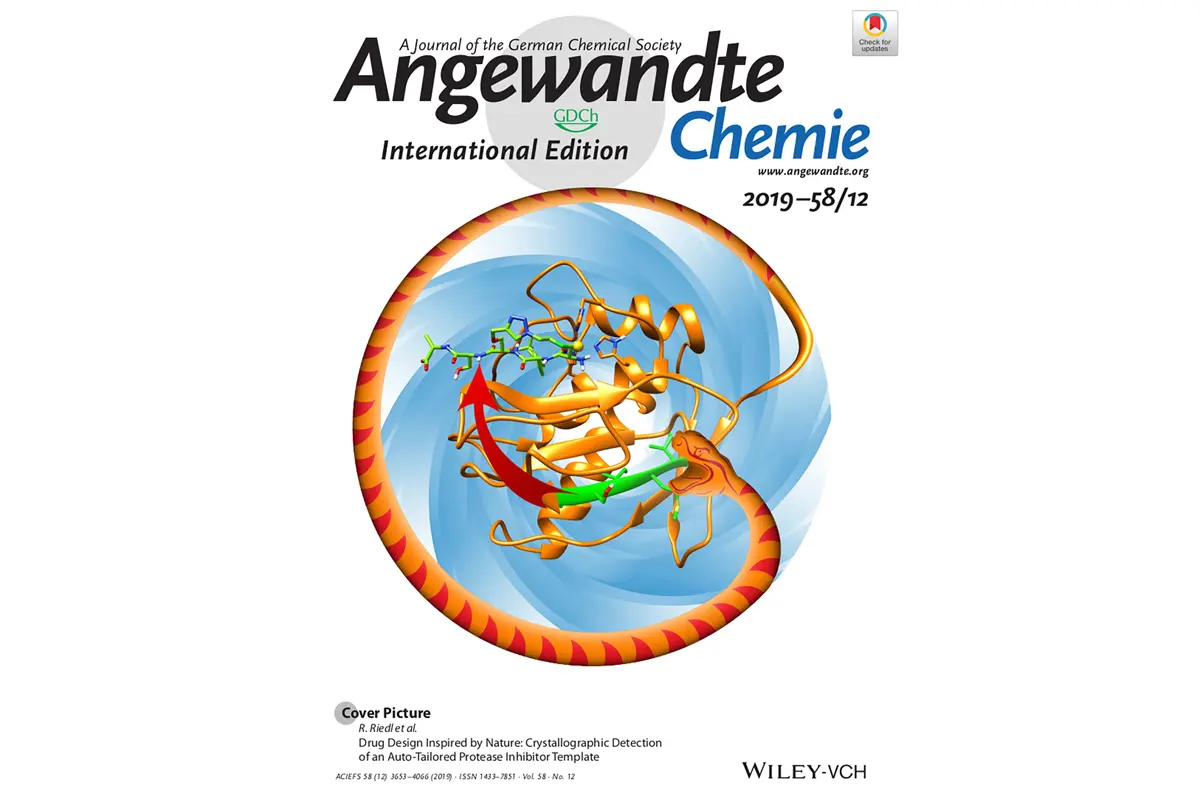Disease-causing protein beaten at its own game
One of the world’s most renowned chemistry journals, Angewandte Chemie, has chosen a study in the field of medicinal chemistry by the ZHAW Zurich University of Applied Sciences as the title story for its current issue and selected it as a «hot paper». The study focuses on the de novo design of cyclic peptides for the inhibition of therapeutically relevant proteinases.

The study was carried out under the direction of Prof. Rainer Riedl, Head of the ZHAW’s Centre for Drug Discovery and Pharmaceutical Product Development at the ICBT Institute of Chemistry and Biotechnology, together with the ZHAW’s Centre of Molecular Biology and Microbiology (Prof. Martin Sievers, ICBT) and structural biologist Dr. Peer Mittl from the University of Zurich.
Active ingredient self-produced by disease-causing protein
Discovering new active ingredients is a key component of pharmaceutical research. To launch a new drug, millions of molecules have to be tested and optimised. Still today, the lead compound identification at the beginning of a project is particularly time-consuming and resource-intensive. In complex procedures, large libraries of potential lead compounds have to be screened for active molecules, which contributes to the high costs of drug development. It would be a great advantage if a therapeutically relevant protein which is responsible for the development of a disease could be used to produce an active ingredient against itself, ideally from its own components. Researchers have discovered exactly this fascinating process in their study and subsequently used the resulting product for the de novo design of a highly effective active drug molecule.
Proteinases a focus of research
Researchers have been focusing on the therapeutic target matrix metalloproteinase-13, which is responsible for a large number of serious diseases (e.g. cancer and inflammatory diseases), for quite some time. Even though it has clearly been proven that this particular proteinase is responsible for the development of such diseases, the pharmaceutical industry has not yet been able to launch a drug against this target protein. This is due to the fact that, to date, all artificially produced active ingredients used in clinical studies have failed because they caused side effects. The ZHAW’s researchers' approach therefore focuses on developing active ingredients derived from natural proteinase inhibitors.
For the first time, a team of researchers from the Institute of Chemistry and Biotechnology was able to detect the partial self-degradation of this therapeutically relevant protein, using X-ray crystallography. As a result, a peptidic ligand, which the proteinase had practically cut out of itself, was discovered, and this was then converted by structure-based de novo design into a cyclic peptidomimetic of the proteinases’ natural tissue inhibitors. This very potent inhibitor is highly attractive for further research, because it is membrane-permeable and shows a promising selectivity profile against biological target structures which are involved in the development of cancer.
A promising approach
Contrary to traditional screening approaches within libraries of synthetic molecules, the researchers started with a natural ligand that had been produced by the therapeutic target protein itself. This represents a new strategy to accelerate pharmaceutical drug discovery, which is why the renowned journal Angewandte Chemie chose this study as the title story and selected it as a «hot paper». Furthermore, this study has already sparked significant interest in the specialised press. The online platform ChemistryViews (run by ChemPubSoc Europe, a partnership of 16 European chemical societies), for example, published an article on the results of the study.
Further information
- Article on ChemistryViews
- Paper in 'Angewandte Chemie'
- F. M. Gall, D. Hohl, D. Frasson, T. Wermelinger, P. R. E. Mittl, M. Sievers, R. Riedl, Angew. Chem. Int. Ed. 2019, 58, 4051.
- Cover of 'Angewandte Chemie'
- F. M. Gall, D. Hohl, D. Frasson, T. Wermelinger, P. R. E. Mittl, M. Sievers, R. Riedl, Angew. Chem. Int. Ed. 2019, 58, 3653.
Caption © Photos ZHAW Wädenswil
Downloads (© Fotos ZHAW Wädenswil)
- Media release «Das krankheitsverursachende Protein mit den eigenen Waffen schlagen» (in German)(PDF 166,7 KB)
- 1_ZHAW researcher Prof. Rainer Riedl, Head of Centre for Drug Discovery and Pharmaceutical Product Development
- 2_ZHAW co-authors: Back row, from the left: Flavio Gall (Medical Chemistry), Rainer Riedl (Medical Chemistry), Martin Sievers (Molecular Biology). Front, from the left: Tobias Wermelinger (Molecular Biology), David Frasson (Molecular Biology).
- 3_Cover-Story; F. M. Gall, D. Hohl, D. Frasson, T. Wermelinger, P. R. E. Mittl, M. Sievers, R. Riedl, Angew. Chem. Int. Ed. 2019, 58, 3653.
Specialist contact:
Prof. Dr. Rainer Riedl, Head of Centre for Drug Discovery and Pharmaceutical Product Development, ICBT Institute of Chemistry and Biotechnology, ZHAW School of Life Sciences und Facility Management, Wädenswil. 058 934 56 18, rainer.riedl@zhaw.ch
Media Relations ZHAW/Wädenswil:
Cornelia Sidler, Media Relations, ZHAW School of Life Sciences und Facility Management, Wädenswil, 058 934 53 66, cornelia.sidler@zhaw.ch